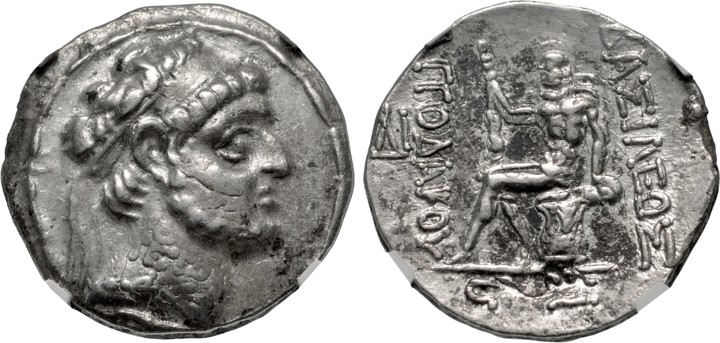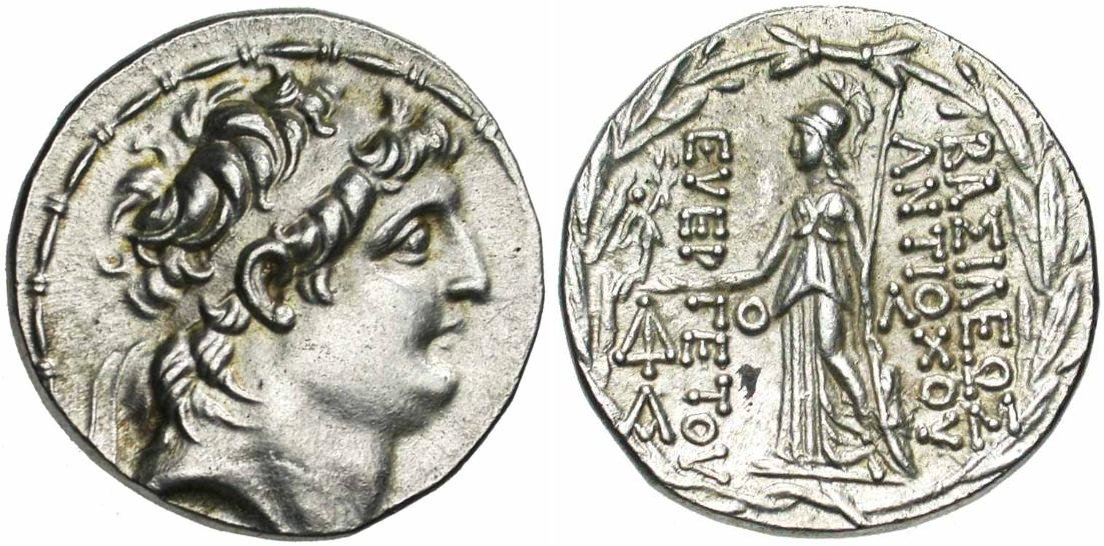106 BCE - 105 BCE | ΒΑΣΙΛΕΩΣ ΑΠΟΔΑΚΟΥ
Overstriking coin
Apodacus_Classical_Numismatic_Group, _126, _28_May_2024, _389.jpg
[1]
Overstruck variety
Antiochus_Evergetes_O.jpg
[2]
|
|
Sale(s)Sale(s) ᵖ:
|
Classical Numismatic Group, 126, 28 May 2024, 389
|
|
|
|
Description
| ObverseInscription or printing placed on the obverse.:
|
Male head right, wearing diadem. Bead-and-reel border.
|
ReverseInscription or printing placed on the reverse.:
|
ΒΑΣΙΛΕΩΣ ΑΠΟΔΑΚΟΥ (Greek) Heracles seated left on rock covered by Nemean lion skin, holding club on knee in right hand and resting left hand on rock face. In outer left, monogram. in exergue, ZΣ (year 207).
|
Mint and issuing power
Chronology
| FromIdentifies the initial date in a range assigned in a numismatic context. 106 BCE toIdentifies the final date in a range assigned in a numismatic context.. 105 BCE
|
Hellenistic 323-30 BC  periodTime period of the numismatic object. periodTime period of the numismatic object.
|
Physical description
MetalThe physical material (usually metal) from which an object is made.: Silver 
|
WeightWeight of the numismatic object (in grams). in grams: 16.3316.33 g <br />16,330 mg <br />
|
DenominationTerm indicating the value of a numismatic object. Examples: tetradrachm, chalkous, denarius.: tetradrachm 
|
AxisDescribes the directional relationship between the obverse and reverse of a numismatic object.: 1212 mm <br />1.2 cm <br />
|
| DiameterDescribes diameter of an object (in mm).: 3333 mm <br />3.3 cm <br />
|
StandardStandard.: Attic
|
References
Description
| ObverseInscription or printing placed on the obverse.:
|
Diademed head of Antiochus r.
|
ReverseInscription or printing placed on the reverse.:
|
BAΣΙΛΕΩΣ∕ ANTIOXOY/ EYEPΓETOY (Greek) Athena standing l. holding Nike and resting l. arm on shield, and holding spear with left, monograms in outer l. field
|
Mint and issuing power
Chronology
| FromIdentifies the initial date in a range assigned in a numismatic context. 138 BCE toIdentifies the final date in a range assigned in a numismatic context.. 129 BCE
|
Hellenistic 323-30 BC  periodTime period of the numismatic object. periodTime period of the numismatic object.
|
Physical description
| DenominationTerm indicating the value of a numismatic object. Examples: tetradrachm, chalkous, denarius. ᵖ:
|
tetradrachm 
|
StandardStandard. ᵖ:
|
Attic
|
References
References
- ^ Alram, Michael (1986), Iranisches Personennamenbuch. Band IV: Nomina Propria Iranica In Nummis, Vienna.
- ^ Nelson, Bradley R. (2011), Numismatic Art of Persia: The Sunrise Collection Part I: Ancient- 650 BC to AD 650, Lancaster
- ^ Houghton, Arthur - Lorber, Catharine C. - Hoover, Oliver D. (2008), Seleucid coins : a comprehensive catalogue. Part 2, Seleucus IV through Antiochus XIII, 2 v., New York - Lancaster - London, (xxx), 120 p. of plates : ill., maps, tables

